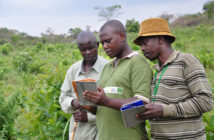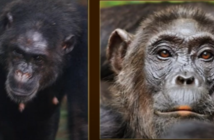The Jane Goodall Institute’s Tchimpounga Chimpanzee Rehabilitation Center in the Republic of the Congo was established in 1992, and since then has provided life-saving treatment and sanctuary to hundreds of chimpanzees.
Once our Tchimpounga sanctuary opened, JGI quickly realized that many of the chimpanzees in need of rescue were victims of illegal wildlife trafficking…and that Tchimpounga would soon be overrun with chimpanzees, causing our resources to be stretched very thin, if we didn’t do something to curb this cruel practice.
One of the most important lessons the Jane Goodall Institute has learned during the nearly four decades that we have fought to conserve chimpanzees and their habitat is that there is no one solution that we can apply to end all of the threats facing Africa’s great apes.
To make a powerful impact on chimpanzee conservation, JGI’s approach must be holistic and mindful of all those who will be impacted, and all those who have the power to help us in our efforts.
This is especially true regarding our efforts to stop the trafficking of chimpanzees in Africa. This illegal practice often begins with a deadly hunt, during which several members of a chimpanzee group are killed by poachers, often for meat to sell at market. The infants of the group are then sold into the pet trafficking trade, facing short, painful and lonely lives as exotic pets or “entertainers”.
To put an end to this practice, JGI has adopted the “triangle approach”. This approach relies on effective cooperation and interplay between three entities: environmental education programs, law enforcement, and sanctuaries.
Environmental Education aims to teach people how they can care for the wildlife and forests in their community, and how they as a community will benefit from doing so. Part of this includes educating people about the laws against keeping chimpanzees as pets, or selling their meat at market.
Once a community member has taken environmental education classes, they will be more likely to speak up when they see an illegal activity that affects local wildlife, such as a neighbor keeping an infant chimpanzee as a pet. However, knowing that this is illegal doesn’t help unless that person has someone to report it to.
This is where law enforcement comes in. By working with conscientious community members, local law enforcement is in a much better place to uphold the laws surrounding illegal wildlife trafficking. Once alerted to the presence of a pet chimpanzee in a village, law enforcement officials are then able to seize the chimpanzee from his or her owner, and charge the owner with a crime if one has been committed.
But law enforcement does not have the expertise or resources necessary to care for a rescued chimpanzee, so unless they are able to find a place for the chimpanzee to be placed after being confiscated, they are unable to remove the chimpanzee from the situation. This is where sanctuaries like JGI’s Tchimpounga sanctuary come in.
By giving law enforcement a safe place to take a confiscated chimpanzee, Tchimpounga helps ensure that chimpanzees are not forced to languish in solitary confinement as an exotic pet. Instead, law enforcement can rescue chimpanzees knowing that each rescued chimp has a spot at Tchimpounga for the rest of his or her life.
It is only be strengthening the partnership and communication between these three entities that JGI can successfully combat the illegal trafficking of chimpanzees.






